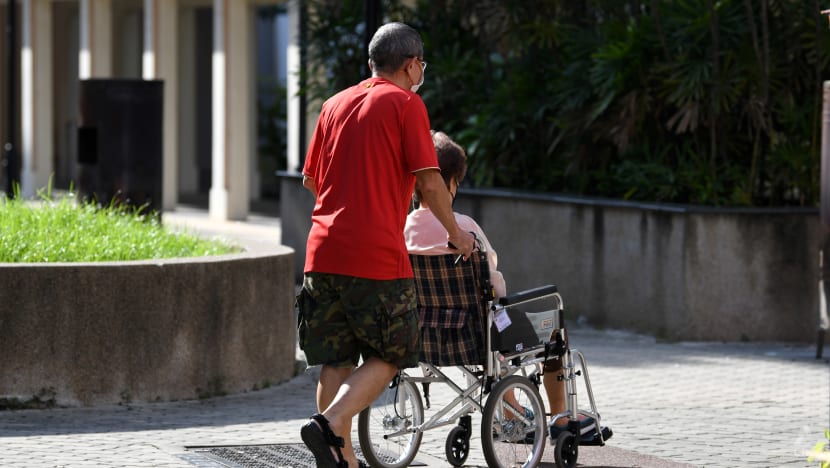Caregivers face not only burden, but reward and benefits in their journey: Study
A total of 278 caregivers took part in the Duke-NUS study, which also identifies the different types of caregivers.

An elderly caregiver in Singapore. (Photo: Calvin Oh/CNA)

This audio is generated by an AI tool.
SINGAPORE: One in five caregivers in Singapore find meaning in looking after their loved ones, despite facing a high caregiving burden, according to a Duke-NUS Medical School study.
As Singapore faces an ageing population, supporting caregivers has become vital.
The wide-ranging study hopes to better support caregivers by understanding their different needs, which can help the sector to come up with more targeted assistance.
FINDING PURPOSE IN CAREGIVING
Findings on the extent of burdens and benefits of caregiving were shared on Wednesday (Mar 13) during a family caregiver symposium.
The event was organised by the Duke-NUS Medical School’s Centre for Ageing Research and Education (CARE) and Tsao Foundation, an organisation working with ageing issues.
“Burdens can be in various facets. It could be psychological burden, it could be physical burden, it could be financial burden, or burden in the form of lost social relationships and lost family ties,” said Dr Rahul Malhotra, deputy director and head of research at the Duke-NUS Medical School’s CARE.
“Benefits are mostly psychological, in the terms of satisfaction and the growth that one perceives as an individual when you provide care to a loved one.”
A total of 278 caregivers took part in the Duke-NUS study, which also identifies the different types of caregivers.
Dr Malhotra said the research is “relatively new, compared to the disproportionate focus on the burden of caregiving”.

Caregivers also value good feedback, and affirming them is crucial in their care journey, he noted.
“It's important for families, clinicians and other people who interact with caregivers to not only provide instrumental support or help with tasks, but also the emotional support to caregivers, validate their efforts, affirm their efforts, (and) give them a word of praise,” Dr Malhotra told CNA’s Singapore Tonight on Wednesday.
“Small things like these do matter, and increase the affirmation and validation that caregivers get from something that we take for granted otherwise.”
SUPPORTING CAREGIVERS
The research is being translated into innovative interventions by the Tsao Foundation.
Ms Susana Harding, senior director of the International Longevity Centre at Tsao Foundation, said the study shows that caregivers are motivated and find purpose in doing so.
“For the caregivers, there are burdens, but there are actually benefits and rewards in the caregiving journey, throughout the caregiving journey,” she added.
“There is a sense that they're able to manage, cope with the everyday caregiving needs, anticipate future challenges, and that they're able to do self care of their own well-being and work towards a balanced life.”
Previously, the focus of caregiving has always been about the burden that they face, said observers.
Ms Harding said: “It was always about the stress. But now with this study, we're able to also identify that there's the positive side to caregiving.”
She added that the project can also help to change their mindset of clinicians, so they can get to know the caregivers early on.
On how this study can help Singapore plan better, Ms Harding said it can be used to engage stakeholders such as policy makers to pay more attention “on the caregivers, not just always the care recipients”, and how support could be channelled to help caregivers identify their aspirations and needs early on and amplify the rewards.
















